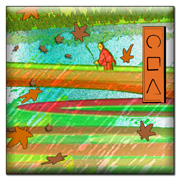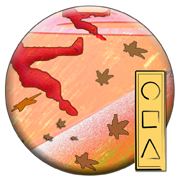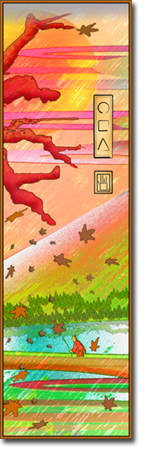On The Way: The Daily Zen Journal
Buddhism is Natural Truth
Buddhadasa Bhikku (1906-1993)

Kalamas, you ought to question, you ought to wonder, your doubts have arisen concerning things you should question. Come, Kalamas,
do not accept (or reject) something as true merely because of oral tradition;
do not accept (or reject) something as true merely because it is widely rumored;
do not accept (or reject) something as true merely because of scriptural citation;
do not accept (or reject) something as true merely because of logical inference;
do not accept (or reject) something as true merely because of reasoned deduction;
do not accept (or reject) something as true merely because of thinking according to appearances;
do not accept (or reject) something as true merely because it holds up to (or goes against) one’s views;
do not accept (or reject) something as true merely because the speaker appears (or does not appear) credible;
do not accept (or reject) something as true merely because the speaker is (or is not) one’s teacher.
Kalamas, whenever you yourselves know that these things are unwholesome, these things are harmful, these things are criticized by the wise, and when practiced according to their own standard these things bring suffering and have no benefit, then you ought to abandon such things.
Kalamas, whenever you yourselves know that these things are wholesome, are harmless, are praised by the wise, and when practiced according to their own standard bring happiness and are beneficial, then you ought to dwell with these things.
~excerpted from the Kalama Sutra
We are here to investigate something of central importance to our lives. I can think of no better way to begin than to be clear about the meaning of the word “Buddhism.” Please relax your preconceptions of Buddhism, as well as religion in general, in order to explore with a fresh mind.

Buddhism is something natural; it exists naturally in nature. At its heart, it is natural law that has been discovered by the Buddha, because it has always been available to discover. Thus, real Buddhism is in no way man-made.
Inseparable from nature, being the truth of nature, Buddhism is in itself free and independent. It depends only on its own reality, which it itself is. Consider the words “fact,” “truth,” and “law.”
Facts or truths exist naturally, in line with the laws of nature. A human being discovered this truth of nature and then showed people how to understand it, so that they could apply it to their everyday lives.
Every aspect of this process of discovery and transmission is natural and unfolds according to natural laws. This reality and the way to understanding it are all there is to Buddhism.

Any who care to look can discover this law for themselves. For this reason, true Buddhism is unique among all other “isms” in that it is not exclusive or monopolistic. It does not assume any exclusive authority to itself, nor is it dependent on any other authority. It remains intellectually free and spiritually independent as a natural truth to be discovered, studied, and explored by any who care to look.
Originally, Buddhism was not called “Buddhism” or “buddha-sasana.” And even when the term sasana was applied to the Buddha’s teachings, it wasn’t used in the way that it is frequently used nowadays to mean “religion.” The Buddha’s disciples did not call it “Buddhism,” the “Buddhism religion,” or anything like that.
The Buddha initially spoke of his teachings as brahmacariya—a way of life that is sublime, excellent, and able to solve all human problems. This supreme way of life later came to be called, “sasana,” which has in turn become associated with the English word “religion,” creating misunderstanding.
The Buddha did not talk about sasana, as Asians do now, to mean “a religion.” If we treat Buddhism in terms of religion, our discussion is likely to become sloppy, complicated, and confusing. Instead, to keep things simple and clear, think of Buddhism in terms of “truth,” “facts,” and “laws of nature.” These truths or laws are the foundation of the Buddha’s teachings. He rediscovered and then revealed them to us. Now we must understand and apply these truths so that we can live free from problems.

Buddhism does not depend on or assume any external authority whatsoever. It is neither exclusive nor possessive. Being Buddhist is a matter of living a sublime way of life, the brahmacariya, wherein one explores the law of nature and lives in harmony with it. It is not a matter of external identity or affiliation. Therefore, you need not convert or register yourself as a Buddhist in order to study and practice Buddism.
You can follow whatever religion pleases you or follow no religion at all, and still study and practice Buddhism. It is simply a matter of how you live your life. Any who are willing to approach, learn, investigate, practice, and live according to natural truth can experience this. Buddhism is available to everyone and is not exclusive in this way.

Another way to understand Buddhism is by thinking about the word buddha, which means “to awaken from sleep” or “to be awake.” We should reflect on the difference between ordinary sleep and ordinary wakefulness. Here, however, “to be awake” means more than simply being awake in an ordinary sense; it means not going through life in a sleepy, befuddled way.
To do so requires that we see things as they really are, that we see the genuine truth of things. Our practice as Buddhists, then, is to wake up, to use that awakening to see everything in the light of truth, and to live accordingly.
Once awakened, we know: we see and experience all things as they actually are. Through knowing, we blossom into the fullness of life—clear, calm, and clean. This is how we understand “Buddha” in Thailand, as the Awakened One, the Knowing One, and the Blossomed One.
The Buddha’s awakening is symbolized by the lotus that rises above muddy pond waters and fully opens to the sun. This is what Buddha and Buddhism are all about.
Source – Under the Bodhi Tree – trans and edited by Santikaro 2017





There seems to be as many descriptions of Buddhism as there are teachers and schools; each represents a different way of interpreting the essential teachings of Buddha.
Since he also had different ways to teach to the varying abilities of people he encountered, there are countless examples of teachings; there is what sounds like the Socratic method where he engages his listener directly to help them see in the moment.
There are many parables and stories used to teach a point, but at heart, none of them represents the core of Buddha’s teaching. And then there is the situation of what the schools of Buddhism have chosen to embrace, the dogma, the ceremonies, the initiations.
What is unique about Buddhism is exemplified by the quote from the Kalama Sutra above. We are not told to believe anything because he said it, we are encouraged to see for ourselves. Which means to take responsibility for investigating, which further means this is not an easy path for someone who just wants to be told what to believe and what to do. It is real work to investigate on one’s own and see for oneself.
That ability is in each of us, but for many it is like a muscle long unused, being soft and weakened from disuse. However, with practice and diligence we all know this can be done.
With enthusiasm,
Elana, Scribe for Daily Zen